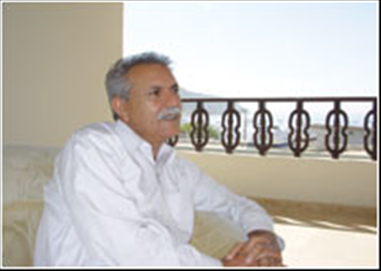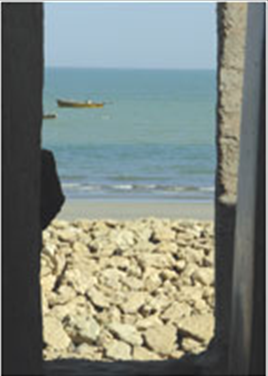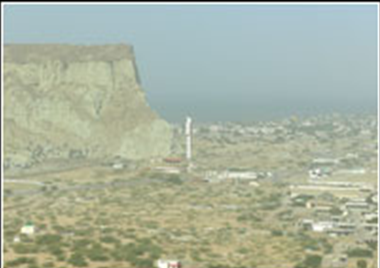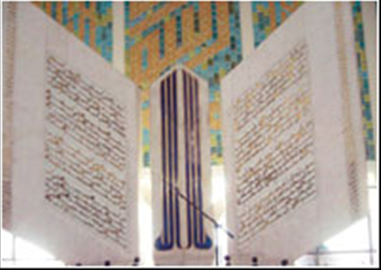Gwadar
This is a collection of articles archived for the excellence of their content. Readers will be able to edit existing articles and post new articles directly |
Gwadar
Perspective: Another time, another place
The once seamless tracts of no man’s land in Gwadar have already been appropriated by investors from other parts of the country.
Minutes after landing in Gwadar, it appears poverty is just about the only thing that’s equally distributed in Pakistan. The small outpost of a town on the western Makran coast may have had its rich and poor all these years but the divide is only just becoming visible as the richie-rich and the nouveau riche arrive.
They come from all over and in all categories: real estate wheeler-dealers from Karachi and Lahore, skilled port workers and technicians from Singapore and China, semi-skilled labourers from Punjab, construction contractors and labourers from Sindh and Punjab, and, nuclear-family holidaymakers in their flashy SUVs from Karachi. The aforementioned have come here to make hay, the last mentioned for a family timeout away from the pressures of the big city.
All outsiders go by the ubiquitous tag of ‘Punjabi’, regardless of their origins -- and that’s not exactly a term of endearment. The influx is outnumbered by that of local migrants from nearby villages who lost everything to flash floods and have perched their thatched huts on what appears to be no man’s land along the airport road. But appearances can be deceiving in this vast, open countryside which seems to be under a perpetual state of sandstorm. Instinct tells you if it’s not the high-intensity desert winds that blur the vision, it will be the scorching sun that is no less menacing, shining as it does on a land that does not even have an aquifer under it to quench the settlers’ thirst. Yet, they come here in droves.
These once seamless tracts of no man’s land have already been appropriated by big and small investors from other parts of the country. The shanties occupying the land seem to be on the move, not towards their intended destination, Gwadar, where they came to seek work, but on the back track to where they came from. Much of the new development is taking place north of the town, towards the mainland.
Gwadar town sticks out like a panhandle into the Arabian Sea. Measuring some five-odd kilometres from north to south and a mere kilometre from east to west, it is flanked on the two sides by clear blue-aqua-green water bays; on the southern tip a massive cliff stretches out like a three kilometre-wide dike, stretching 23km along the open sea. It is largely on this cliff that the rich and famous have invested in land and DHA-like sprawling road works of a housing scheme are in the making. Pakistan Navy occupies some 14km-long stretch of the cliff on the eastern side; the western-most tip with a scenic beach is reserved for a five-star resort, a second one to be built on the cliff, and the housing estate lies in between.
Looking north from the cliff gives a bird’s eye view of Gwadar town and its two bays; on the eastern side of the cliff are also located the new seaport and the jetty. This side of the panhandle is barricaded at three points and manned by Frontier Constabulary to screen only the relevant people wishing to enter the port area. These include technicians and some local and immigrant workers who have to walk a good kilometre to get to the dockyard. The area is out of bounds to all others. Looking south from the cliff offers a panoramic vista over the wide, deep-blue sea.
In the town proper, tiny roads and narrow lanes zigzag their way through mud-lined hamlets and many shabbily built two-storey structures, old and new. The new bazaar area stretches along the old Airport Road and the old one, the Shahi Bazaar, lies in a small alley which is partially covered with tarpaulins along the eastern bay area. It is flanked by an open common where goods are loaded and off loaded by manual labour -- a scene right out of the 17-century fishing village that Karachi had started out as.
The bazaars offer only everyday merchandise and essential food items. The town is home to a population numbered anywhere between 30,000 to 100,000, as variously claimed. The deputy nazim (mayor) says the figure was over 50,000 in the 1998 census, and is now double that. The residents are mostly the age-old Baloch settlers and fishermen, with a sprinkling of recent migrant workers and petty traders. Migrant workers include rural Baloch and Sindhis, while traders are mostly Pashtoons and Punjabis.
Most of the fresh produce is brought here from neighbouring Iran, from the international border some 80km to the west. So are diesel and petroleum products, basic linen and everyday bric-a-brac. With atta becoming a rarity in recent weeks, flour too is being brought over from Iran and sold at Rs40 a kg. No formal trade exists between Pakistan and Iran from near Gwadar, but daily essentials change hands, with enough family ties on both sides to keep the supplies coming. The only formal supply coming out of Iran under a bilateral contract, now holding for five years, is the port city’s electricity.
Only the Gwadrians having travelled to Karachi or Quetta may have an inkling to what loadshedding is.— MR
Gwadar II
Gwadar’s best kept secret It has to be the people. Definitely. Having remained largely insulated for a long time from the rest of the country until very recently, society here follows a traditional, cooperative rather a competitive way of life.
The spirit remains a tangible aspect of social life. Literacy may run very low, but the lack of it has not robbed the people of their hospitality, finer social values and a general finesse in their mannerism. No one carries firearms; even petty theft is a rare phenomenon; private security guards are unheard of.
“We’re a simple, honest people, with perhaps a heightened sense of privacy,” says the deputy mayor Abdul Ghaffar Hoth. “So much so that even if two boys are sitting in a corner, a third approaching chap would call out loud from a distance to see if he would not be seen as an intruder in their conversation. We also respect the physical space around an individual; touching someone you do not know well enough is a violation of that space.”
The frisking done by the Frontier Constabulary men at the check posts set up near the new seaport is perhaps a point of reference. The FC set up pickets in town after a car bomb killed three Chinese port engineers in May, 2004. The attack was blamed on Baloch nationalists.
“The FC is all over the place, now more so than ever before,” says Mohsin, 34 and a nationalist party worker.
“They leave us alone when we go to visit our family and friends across the border in Iran. But on the way back they confiscate our little gifts,” he complains.
It may only be a barrel of diesel bought at Rs15 a litre, which sells in Gwadar for a bit more. More basic ‘gifts’ include baked bread, vegetables or dry fruit, mostly given away to the Pakistani Baloch by their Iranian kin from the weekly basic survival ration allowance the Iranian government gives to them free of cost.
“Getting their leftovers is the only livelihood I have, but I am not allowed even that small a means of subsistence. There are no jobs for the Baloch. In our own land. Why?” questions Mohsin.
“The local people do not want to take up work. They make more money from border trade. Others sell fish and make even more,” says a Pathan driver from lower Dir, who is out on a secondment from his hotel in Peshawar.
“Our people are good enough to be taken in Oman Army and in the police force in Dubai. Many work at the ports there. Even our fishermen are now largely robbed of their earnings. Big, foreign trawlers have been given licences to fish here. The local ones are restricted to selling their catch to a packaging factory through a middleman who exploits them,” says Abid Sohrabi, poet and a nationalist-cum-APDM spokesman.
“There’s none of the Baloch in the FC. At the port there are no more than 20 out of a work force of 120. No other district in Pakistan has a chief security officer. Why here? We’re a peaceful people and none’s armed.” questions Sohrabi without losing his calm.
“If a small jeep is caught with a barrel of diesel, the FC can confiscate the vehicle. You may have to give up to a hundred thousand in bribe to get your jeep back,” says another young man who does not name himself.
“The government should regularise and then regulate such small trade across the border. That way nobody loses, the state benefits and the FC cannot harass us anymore,” he suggests.
There are other important issues on the people’s minds.
Naseer Baloch, a young journalist who has recently moved to Gwadar from his native Turbat explains: “Very few of the local people have been given property ownership rights since the construction of the port. Others who were required to relocate were given some compensation, up to Rs150,000 per home-owner, by the authorities.”
“The rest of us are enlisted as encroachers even though our families have been here for generations,” says a young fisherman.
Sohrabi intervenes: “They cannot live here anymore because they have no papers. They cannot move away from the bay area because that’s their livelihood.”
Another fisherman complains, “And now there is a complete ban on any further building within the port authority’s jurisdiction, which is the entire town of Gwadar.”
Deputy Mayor Hoth agrees, but says some construction has been going on, mostly home improvements and expansion by people who sold their land to developers.
“What do you do when your family’s needs for accommodation grow?” he reasons, “The right way to go for relocation is the way adopted by the port authority in the case of those who were given compensation for what they owned. If that happens with everyone involved, all will work out well. ”
“Provided their right to ownership is established, which is not the case with most of the fishermen living in Gwadar,” Naseer Baloch clarifies.
There have been a couple of shutter down strikes in Gwadar over the issue, but none dangerous enough to send the petty traders packing most of who have come here from Pashtoon areas or from Punjab. The developers too have had little cause to fear.
“The coastal highway is perhaps the safest in the country. There’s practically nothing for 650km between Karachi and here. Only small towns of Ormara and Pasni, and a few very basic roadside tea kiosks. But we felt perfectly safe driving here all the way with the family, including children,” says a Karachi-based businessman, a holidaymaker, back at the hotel.
Out in the street the average Makran Baloch is a docile and a welcoming man. Their women may observe the veil, but they do accompany their men to the market. Many are seen shopping without a veil in Jannat Bazaar, a portion reserved for women shoppers. The men greet you with a smile and a warm handshake, even though you may now be perceived as an outsider who has come to claim a share from the emerging riches in their immediate vicinity, and of which they certainly do not have a fair share. Whatever there is to share in their own belongings and all that is within their means, you’re welcome to it as their guest.
“No need to call a cab. I’ll drop you back at the hotel when you are done with your work in town. Here, take my cell phone number,” a young man you meet in an office offers a free ride.
The next day when you run into him, he voices disappointment that the generous offer was not taken up. “I waited for your call. Perhaps you had other plans,” he says with a nod of understanding, and leaves you alone.
Offers of tea, food and shelter from many who only eke out a subsistence level existence are the norm, and an endearing aspect of deeply ingrained social values. This is more than amazing at a time when many seem less able to adopt the competitive lifestyle that recent changes around them have brought and are fearful even of losing the little that they have.
“In 1958 it was my father who had read out the letter of thanks to the government of Pakistan when the people of the area decided to seek Pakistani nationality, giving up their original Omani,” asserts Nasir Rahim, a young journalist, schoolteacher and a social worker. “We are a patriotic people,” he maintains.
“Back then it was better to go with Pakistan because we would be closer to our own people in Balochistan, and also because Oman was perhaps poorer because oil had yet to be struck,” veteran politician and old Bizenjo-loyalist Husain Ashraf clarifies candidly.
You look at them and marvel why anyone would stop making people as honest and generous as the Makran Baloch. The answer may be found in the painful loss that they are being subjected to by the forces of market economy, unprotected as many feel by the absence of socioeconomic safeguards or a state-run affirmative action programme aimed at helping them latch on to the new way of competitive life.
Consequently, a majority is standing by and watching the development take place around them, with little hope at present that it might bring some prosperity to their children in the years to come. Still, contrary to the bad press given to Gwadar since the killing here of three Chinese engineers nearly four years ago, there is little anger or resentment aimed at development.
Disappointment is the only word mentioned when probed.





